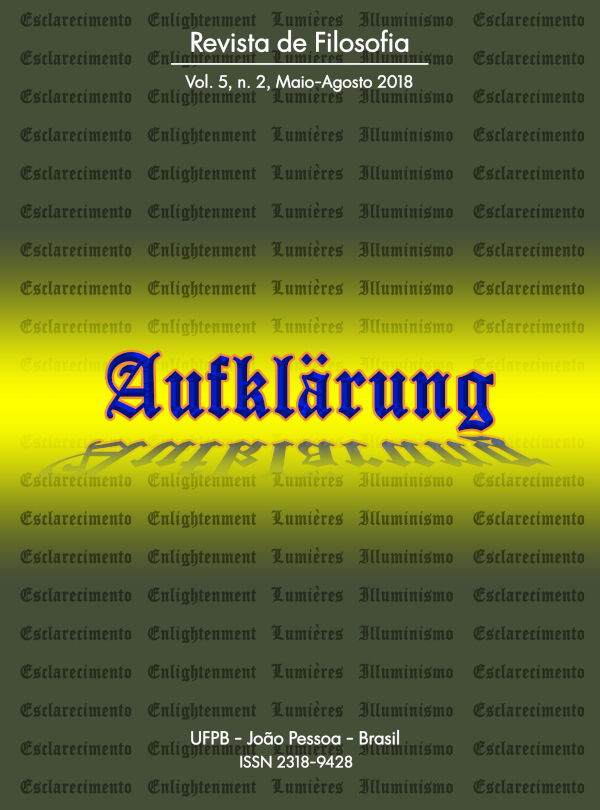Towards a Methodological Scheme-Interpretation
DOI:
https://doi.org/10.18012/arf.2016.41966Keywords:
Schemas, perception, knowledge, neurology, psychologyAbstract
Any kind of knowledge, cognition, perception, and action is necessarily shaped by (re)activation of "schemata". Any interpretation is schema (re)activation. Schemata are epistemologically speaking "structural" activation patterns which are psychologically and neurologically speaking accommodated, adapted, "learned" by (co- and re)activating neuronal assemblies. Six levels of interpretative schema activations (schema interpretations) are outlined from invariable primary "interpretations" through conventional, classificatory and justificatory as well as meta-interpretations. Constitutive schema interpretations are unavoidable. Many philosophical problems will have to be reformulated or reinterpreted along these lines.Downloads
References
ABEL, G., Interpretationswelten. Frankfurt/M.: Suhrkamp 1993.
GOFFMAN, E., Rahmen-Analyse. Frankfurt/M. 1977 (Orig. 1974).
KANT, I., Kritik der reinen Vernunft. 2. Auflage 1787. (KrV B) Hamburg: Meiner 1956.
LENK, H., Zu einem methodologischen Interpretationskonstruktionismus. In: Journal for General Philosophy of Science 22 (1991), 283-302.
LENK, H., Interpretationskonstrukte. Zur Kritik der interpretatorischen Vernunft. Frankfurt/M.: Suhrkamp, 1993.
LENK, H., Philosophie und Interpretation. Frankfurt/M.: Suhrkamp, 1993.
LENK, H., Toward a Systematic Interpretationism. In: Stapleton, T. J. (Ed.), The Question of Hermeneutics. Dordrecht: Kluwer, 1994, 79-88.
LENK, H., Interpretation und Realitaet. Frankfurt/M. 1995, Suhrkamp.
LENK, H., Schemaspiele. Frankfurt/M.: Suhrkamp 1995.
LENK, H., Das metainterpretierende Wesen. In: Allgemeine Zeitschrift für Philosophie 20.1 (1995a), 39-47.
LENK, H., Interpretationen und Impraegnationen. in: Simon, J. (Ed.), Orientierung in Zeichen. Frankfurt/M.: Suhrkamp 1997, 19-40.
MALSBURG, C. von der, Am I Thinking Assemblies? In: Palm, G. - Aertson, A. (Eds.), Brain Theory. Heidelberg/New York: Springer 1986, 161-176.
MILLIKAN, R. G., Language, Thought and Other Biological Categories. Cambridge MA: MIT, 1984.
MINSKY, M., Frame-System Theory. In: Schank, R. C. - Nash-Weber, B. L. (Eds.), Theoretical Issues in Natural Language Processing. 1975 (reprint MIT). Also in: Johnson-Laird, P. N. - Wason, P. C. (Eds.), Thinking. Cambridge 1977.
NEISSER, U., Cognitive Psychology. New York: Meredith 1966.
NEISSER, U., Cognition and Reality, N. Y. 1976.
RAKIC, P. - Singer, W. (Eds.), Neurobiology of Neocortex. In: Dahlem Workshop Reports. Chichester: Wiley, 1988.
ROTH, G., Kognition: die Entstehung von Bedeutung im Gehirn. In: Krohn, W. - Küppers, G. (Eds.), Emergenz: Die Entstehung von Ordnung, Organisation und Bedeutung. Frankfurt/M.: Suhrkamp 1992, 104-133.
RROTH, G., Das Gehirn und seine Wirklichkeit. Frankfurt/M.: Suhrkamp 1994.
RUMELHART, D. E., Schemata: The Building Blocks of Cognition. Center for Human Information Processing, University of California, San-Diego-La Jolla, quoted after CHIP-Report 79, 1978 (also in Spiro, R. - Bruce, B. - Brewer, W. (Hg.), Theoretical Issues in Reading Comprehension. Hillsdale NJ 1980).
SCHANK, R. C. - Abelson, R., Scripts, Plans, Goals, and Understanding. Hillsdale NJ: Earlbaum 1977.
SINGER, W. (Ed.), Gehirn und Kognition, Special Issue of Spektrum der Wissenschaft. Heidelberg 1990.
Additional Files
Published
How to Cite
Issue
Section
License
Journal general policy
1.This journal works under a Creative Commons License aplied to online journals. That icence can be read in the following link: Creative Commons Attribution 4.0 International (CC BY 4.0).
2.Accordingly to this License, a)the journal declares that authors hold the copyright of their articles without restrictions, and they can archieve them as post-print elsewhere. b)the journal allow the author(s) to retain publishing rights without restrictions.
Metadata Policy for information describing items in the repository
1. Anyone may access the metadata free of charge at anytime.
2.The metadata may be re-used in any medium without prior permission, even commercial purposes provided the OAI Identifier or a link to the original metadata record are given, under the terms of a CC BY license refered for the Journal.







































